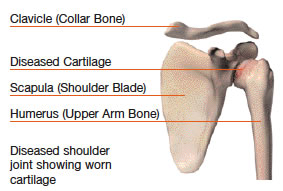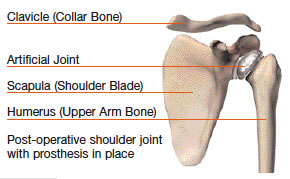Dedicated to Our Patients


 What Causes Shoulder Joint Pain?
What Causes Shoulder Joint Pain?
One of the most common causes of joint
pain is arthritis. The most common types
of arthritis are:
Osteoarthritis (OA)
Sometimes called
degenerative arthritis because it is a
“wearing out” condition involving the
breakdown of cartilage in the joints. When
cartilage wears away, the bones rub against
each other, causing pain and stiffness. OA
usually occurs in people aged 50 years and
older, and frequently in individuals with
a family history of osteoarthritis.
The most common cause of shoulder replacement, OA can occur without a shoulder injury. However, this seldom happens since the shoulder is not a weight-bearing joint like the knee or hip. Instead, shoulder OA commonly occurs many years following a shoulder injury, such as a dislocation, that has led to joint instability and repeated shoulder dislocations — damaging the shoulder joint so that OA develops.
Rheumatoid Arthritis (RA)
Produces
chemical changes in the joint space that
cause it to become thickened and inflamed.
In turn, the synovial fluid destroys cartilage.
The end result is cartilage loss, pain, and
stiffness. RA affects women about 3 times
more often than men, and may affect
other organs of the body.
Post-traumatic Arthritis
May develop
after an injury to the joint in which the
bone and cartilage do not heal properly.
The joint is no longer smooth, and these irregularities lead to more wear on the
joint surfaces.
Other causes of joint pain include avascular necrosis, which can result when bone is deprived of its normal blood supply (for example, after organ transplantation or long-term cortisone treatment), and deformity or direct injury to the joint.
Having an Orthopaedic Evaluation
While every orthopaedic evaluation is
different, there are many commonly used
tests that an orthopaedic specialist may
consider in evaluating a patient’s condition.
The orthopaedic evaluation usually
consists of:
 Treatment Options
Treatment Options
Following an orthopaedic evaluation, the
orthopaedic specialist will review and
discuss the results with you. Based on his
or her diagnosis, your treatment options
may include:
If you and your orthopaedic specialist decide that shoulder joint replacement surgery is an option to relieve your pain, the orthopaedic specialist will provide the details of which type of artificial joint he or she will use, what you need to know to prepare for the surgery, how the surgery will be performed, and what results you can expect after the surgery.